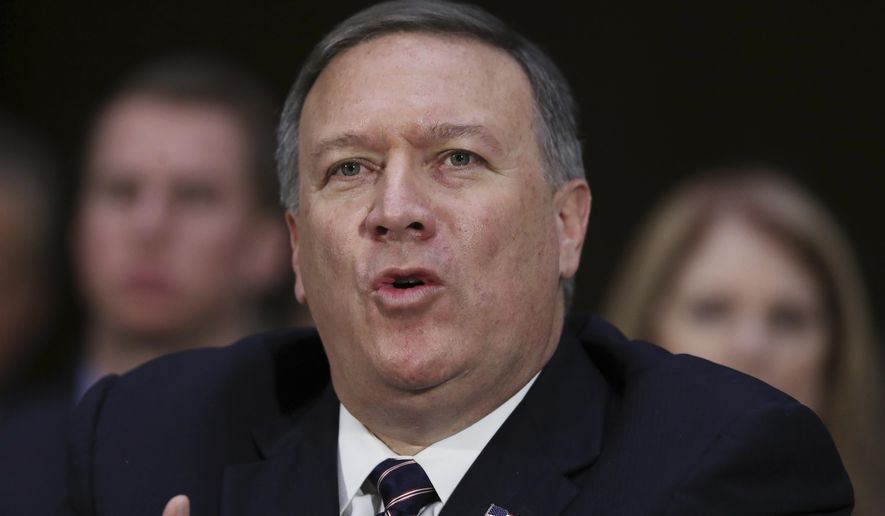Jumping headfirst into the fake news debate, CIA Director Mike Pompeo warned Americans about the dangers of “false narratives” and blasted the self-described transparency organization WikiLeaks, comparing it to “a hostile intelligence service” that he said actively worked with Russia to undermine American democracy.
“It is time to call out WikiLeaks for what it really is,” Mr. Pompeo, a former Kansas congressman, said in his first extended public remarks since being tapped by President Trump to lead the nation’s top spy agency. “WikiLeaks walks like a hostile intelligence service and talks like a hostile intelligence service,” adding that Russia’s GRU intelligence service had used the group to distribute hacked material during the 2016 U.S. presidential election.
The new CIA director also criticized other high-profile leakers — including former Army Private Chelsea Manning and National Security Agency leaker Edward Snowden. Mr. Pompeo said Mr. Snowden wasn’t interested in grand concepts of freedom and transparency, “but simply his own celebrity.”
While Mr. Trump praised WikiLeaks’ revelations during the campaign, Washington’s top intelligence analysts in January concluded the Kremlin used hackers to try and undermine Americans’ faith in the 2016 election and to try and help elect Mr. Trump. WikiLeaks and Russia’s state-sponsored news agency, Russia Today, were both instrumental in the hacking, the Office of the Director of National Intelligence reported.
Mr. Pompeo had another reason to tear into the group: Last month WikiLeaks also triggered what was believed to be the largest leak of CIA documents in history when it published thousands of files detailing what it described as the agency’s hacking abilities, including tools it said the U.S. government used to break into computers, mobile phones and even smart TVs.
Mr. Pompeo denounced the leaks and said WikiLeaks overwhelmingly targets the U.S. and actually encourages people to join the CIA to steal intelligence. He then hammered its founder, Julian Assange, who currently lives in the Ecuadoran Embassy in London, where he was granted political asylum in 2012. While not formally charged in the U.S., Mr. Assange has said he fears he’ll be arrested and tried for espionage if he leaves his diplomatic refuge.
On Wednesday Mr. Pompeo called Mr. Assange a “narcissistic fraud and coward who hides behind a screen,” while warning that the threat to U.S. cybersecurity is only growing.
Mr. Pompeo pointed out that the Chinese and Iranian governments invested significant amounts in the types of technologies and information warfare tools that the Russians have deployed with such success.
Mr. Pompeo also addressed the unusual nature of his remarks — CIA directors rarely speak in public and, even more rarely, just a few months into their tenure — by joking that he’d actually planned his first public speech for the spring of 2018.
The room at the Washington think tank hosting him, the Center for Strategic and International Studies, was so crowded, the head spy began his remarks 15 minutes early and delivered his words with a noted urgency. “Our government has not done enough looking at this new risk,” he said, “Our defense will not be static. We need to be as clever and innovative as the enemies we face.”
The roughly 20-minute speech and a Q&A session covered a wide range of topics, including the new president’s perceived rift with the broader U.S. intelligence community. Mr. Pompeo said Mr. Trump displayed “every confidence” in America’s intelligence services, and that he and new Director of National Intelligence Dan Coats brief the president almost every morning.
When asked how Mr. Trump consumes the intelligence reports, by video, pictures or word, Mr. Pompeo joked that “this issue consumes Washington.”
Mr. Pompeo said North Korea and Iran remained atop the agency’s list of top priorities, and that China and Turkey had recently been more cooperative assisting Washington with issues in their respective regions.
Regarding the sweeping reorganization proposal of John Brennan, his predecessor at the spy agency, Mr. Pompeo said he welcomed the changes.
“A once-a-decade scrub of [the] intelligence community seems like a good thing to me,” he said, but added that he was unsure of future White House plans.
• Dan Boylan can be reached at dboylan@washingtontimes.com.




Please read our comment policy before commenting.